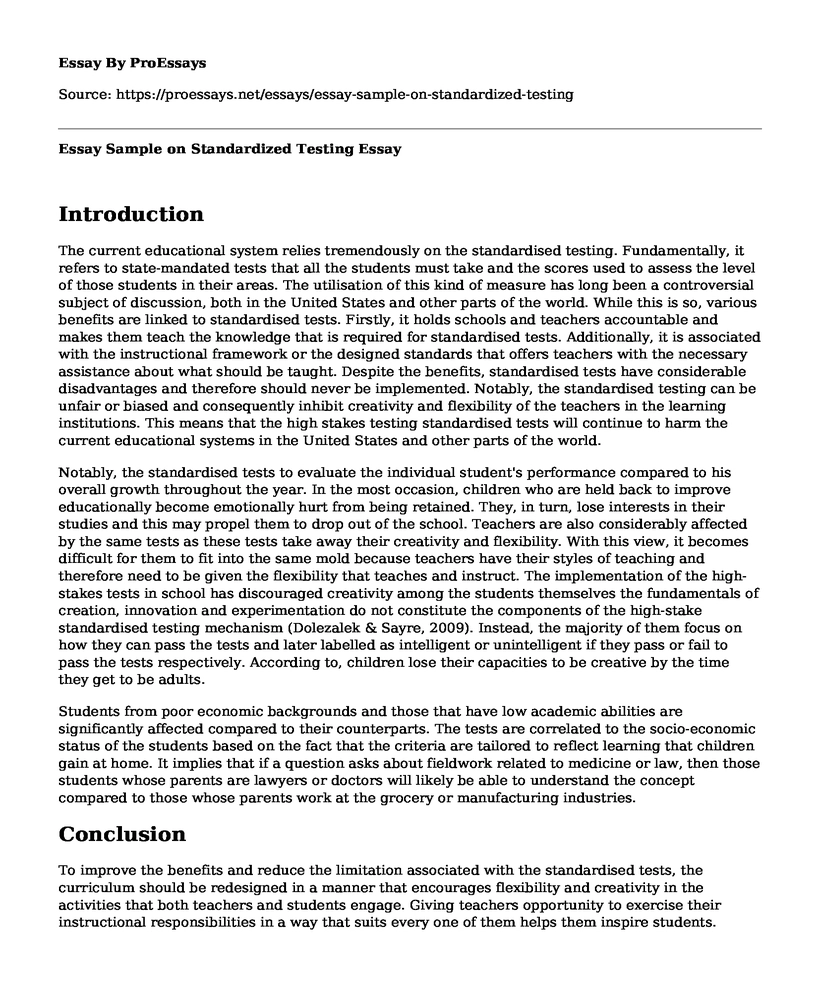Introduction
The current educational system relies tremendously on the standardised testing. Fundamentally, it refers to state-mandated tests that all the students must take and the scores used to assess the level of those students in their areas. The utilisation of this kind of measure has long been a controversial subject of discussion, both in the United States and other parts of the world. While this is so, various benefits are linked to standardised tests. Firstly, it holds schools and teachers accountable and makes them teach the knowledge that is required for standardised tests. Additionally, it is associated with the instructional framework or the designed standards that offers teachers with the necessary assistance about what should be taught. Despite the benefits, standardised tests have considerable disadvantages and therefore should never be implemented. Notably, the standardised testing can be unfair or biased and consequently inhibit creativity and flexibility of the teachers in the learning institutions. This means that the high stakes testing standardised tests will continue to harm the current educational systems in the United States and other parts of the world.
Notably, the standardised tests to evaluate the individual student's performance compared to his overall growth throughout the year. In the most occasion, children who are held back to improve educationally become emotionally hurt from being retained. They, in turn, lose interests in their studies and this may propel them to drop out of the school. Teachers are also considerably affected by the same tests as these tests take away their creativity and flexibility. With this view, it becomes difficult for them to fit into the same mold because teachers have their styles of teaching and therefore need to be given the flexibility that teaches and instruct. The implementation of the high-stakes tests in school has discouraged creativity among the students themselves the fundamentals of creation, innovation and experimentation do not constitute the components of the high-stake standardised testing mechanism (Dolezalek & Sayre, 2009). Instead, the majority of them focus on how they can pass the tests and later labelled as intelligent or unintelligent if they pass or fail to pass the tests respectively. According to, children lose their capacities to be creative by the time they get to be adults.
Students from poor economic backgrounds and those that have low academic abilities are significantly affected compared to their counterparts. The tests are correlated to the socio-economic status of the students based on the fact that the criteria are tailored to reflect learning that children gain at home. It implies that if a question asks about fieldwork related to medicine or law, then those students whose parents are lawyers or doctors will likely be able to understand the concept compared to those whose parents work at the grocery or manufacturing industries.
Conclusion
To improve the benefits and reduce the limitation associated with the standardised tests, the curriculum should be redesigned in a manner that encourages flexibility and creativity in the activities that both teachers and students engage. Giving teachers opportunity to exercise their instructional responsibilities in a way that suits every one of them helps them inspire students. Secondly, the tests should not be tailored to reflect the socio-economic status of the students. Lastly, the fundamentals of creation, innovation and experimentation should form the core of the tests such that the students are encouraged to obtain both the theoretical and practical knowledge and skills after the completion of their studies.
References
Dolezalek, H., & Sayre, R. . (2009). Standardized testing in schools. Edina, Minn: ABDO Pub. Co.
Cite this page
Essay Sample on Standardized Testing. (2022, Mar 14). Retrieved from https://proessays.net/essays/essay-sample-on-standardized-testing
If you are the original author of this essay and no longer wish to have it published on the ProEssays website, please click below to request its removal:
- Bullying in Schools in the United States Essay
- UAE University of Abu Dhabi 2019 Graduation Ceremony - Essay Sample
- Paper Example on Student Perception of Revenge, Family, Luck and Learning
- Essay on Jerry's New Adventure: Climbing Against All Odds
- Essay Example on Role of Academic Nurse Educator: Teaching & Clinical Proficiency
- Early Childhood Education in America: Adapting for a Diverse Population - Essay Sample
- Free Paper Example: University of Virginia Violates Human Cloning Act HCA







